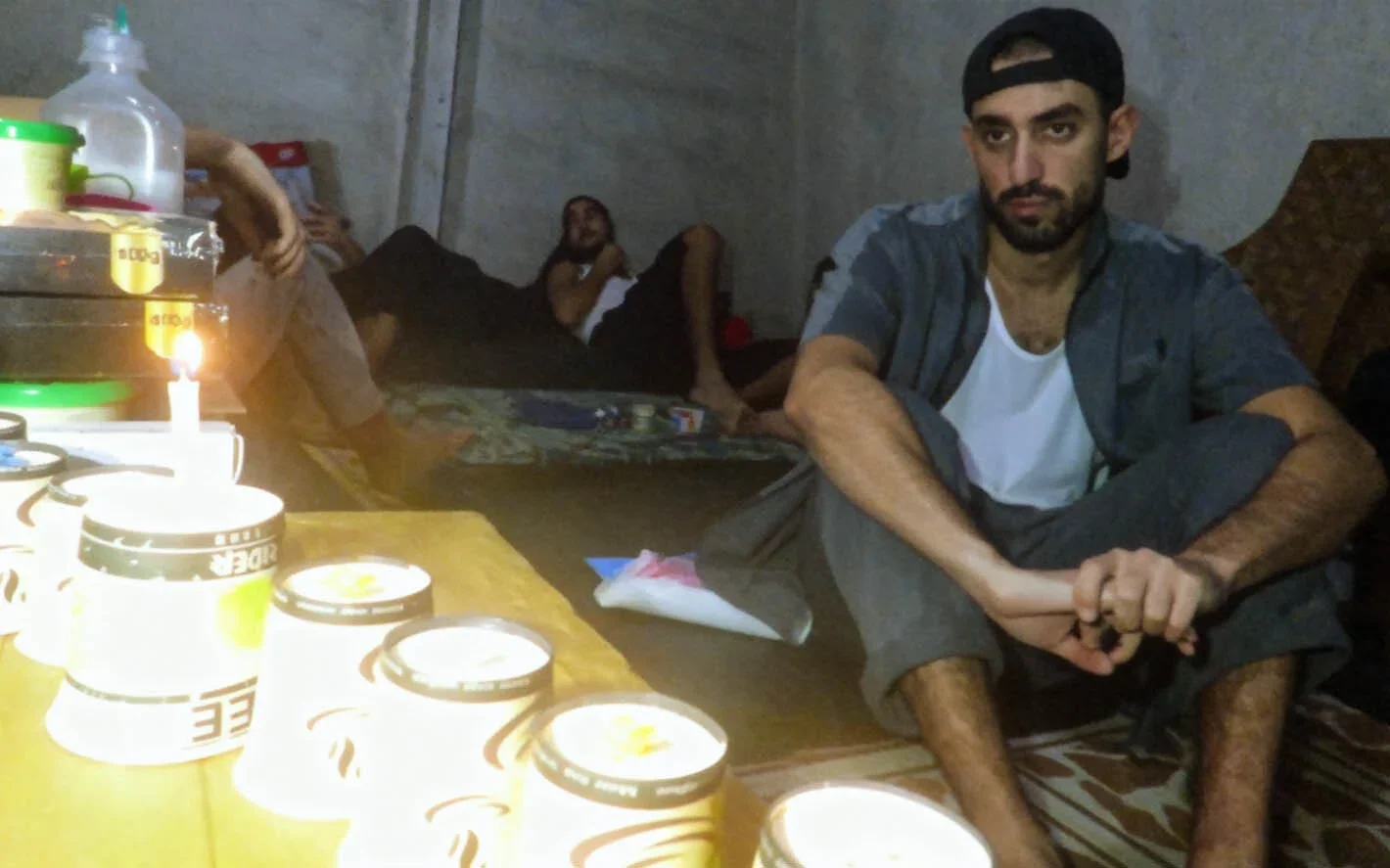The Spark Within: The Story of Our Hostages
This footage, obtained by the IDF from Gaza, shows hostage Ori Danino with fellow hostages after the lit the Chanukah Menorah in Hamas captivity in late 2023
Matan Angrest, 22, was kidnapped by Hamas on October 7 from his tank near Nahal Oz after a fierce battle that left the rest of his crew dead. Despite suffering severe injuries and brutal torture, he described his experience as “a series of miracles.” Just weeks into captivity, Matan demanded a siddur, Chumash, and tefillin, and shockingly, his captors complied. “I prayed three times a day: morning, afternoon, and night,” he recalled. “It protected me; it gave me hope.”
Rom Braslavski, 21, was taken from the Nova music festival after rescuing others despite being wounded in both hands. Throughout his captivity, he was repeatedly pressured to convert to Islam, with promises of better treatment and more food. For two years, he refused. When finally freed, his first act was to put on tefillin. “Rom didn’t break,” said his mother. “He came back saying, ‘I am a Jew. I am a strong Jew.’”
Agam Berger, 20, another former hostage, shared her story in The Wall Street Journal. She described the unbearable pressure she faced when her Hamas captor tried to coerce her into converting to Islam. Yet even under those conditions, she remained steadfast. She refused to eat meat that was not kosher, refrained from chametz during Passover, and prayed daily with a siddur she eventually received.
“Our faith and covenant with G-d is more powerful than any cruel captor,” Agam wrote.
These are just a few of the many stories recounted by these brave men and women. Many of these hostages came from seemingly non-religious backgrounds, yet under extreme duress, their inner spark ignited.
In the depths of captivity, under the most inhumane conditions imaginable, the hostages in Gaza discovered something extraordinary, not despair, but faith. Their stories reveal the indestructible spark of G-d within every Jew, a spark that no darkness can extinguish.
If one ever sought laboratory proof of the Jewish soul’s existence, one need only listen to their stories.
The Divine Spark Within
Rabbi Schneur Zalman of Liadi teaches in the holy book of Tanya that every person possesses a nefesh Elokit, a Divine soul, inherently drawn toward goodness, compassion, and truth. But we also possess a nefesh habahamit, an animal soul, which is selfish and concerned with material pursuits alone. At times, our animal soul’s instinct, habits, environment, and emotion may cloud our inner Divine light, but when one chooses to act with kindness or faith despite hardship, that deeper essence shines through.
This idea, that goodness is intrinsic, is beautifully modeled by Abraham and Sarah in this week’s Torah portion, Vayeira. Their tent stood open on all sides, welcoming travelers and strangers with food, rest, and love. But their hospitality extended beyond physical care. Abraham sought to awaken the G-dly spark within each guest.
The Talmud (Sotah 10a) recounts that after guests ate and expressed thanks to their hosts, Abraham urged them:
“Did you eat what is mine? You ate from the food of the G-d of the world. Therefore, bless and thank Him.”
The Midrash recounts further that if a guest refused to acknowledge G-d, Abraham would respond: “If you insist that you have eaten my food, then you owe me the full price of the meal”. In that way, even those who initially refused would reluctantly thank G-d for their meal.
What value is a prayer uttered under pressure? Abraham saw beyond the surface. He understood that even a hesitant acknowledgment of G-d awakens the soul’s truth. Every person, no matter how distant, carries a Divine spark waiting to be uncovered.
Abraham’s approach reminds us: acts of kindness, words of encouragement, or spiritual invitations can reveal holiness within others, even when it seems hidden.
The Lesson for Our Time
Over the past two years, our people have faced immense pain, yet also remarkable unity. Across backgrounds, Jews have reached out to one another, shared prayers, supported Israel, and stood proud of their heritage. This awakening, like the faith of the hostages, flows from the same source, the spark of G-d that connects us all.
Abraham and Sarah’s example calls us to do the same: to open our doors and hearts, to help others discover their divine essence. Invite a friend to Shabbat dinner. Encourage a neighbor to put up a mezuzah. Give extra tzedakah, learn Torah, don tefillin, pray for Israel.
Each act of light dispels the darkness a little more.
A Vision of Redemption
The Prophet Amos foresaw a time when “people will hunger, but not for bread, nor thirst for water, but to hear the word of G-d” (Amos 8:11). That hunger is visible today, in the faith of those who suffered, in the unity of our people, in the yearning to reconnect with our source and our identity.
May we soon see the fulfillment of Isaiah’s vision:
“They shall beat their swords into plowshares... Nation shall not lift sword against nation, neither shall they learn war anymore.” (Isaiah 2:4)
Let us reveal that Divine spark, in ourselves and in others, and usher in the ultimate redemption with the coming of Moshiach now!


